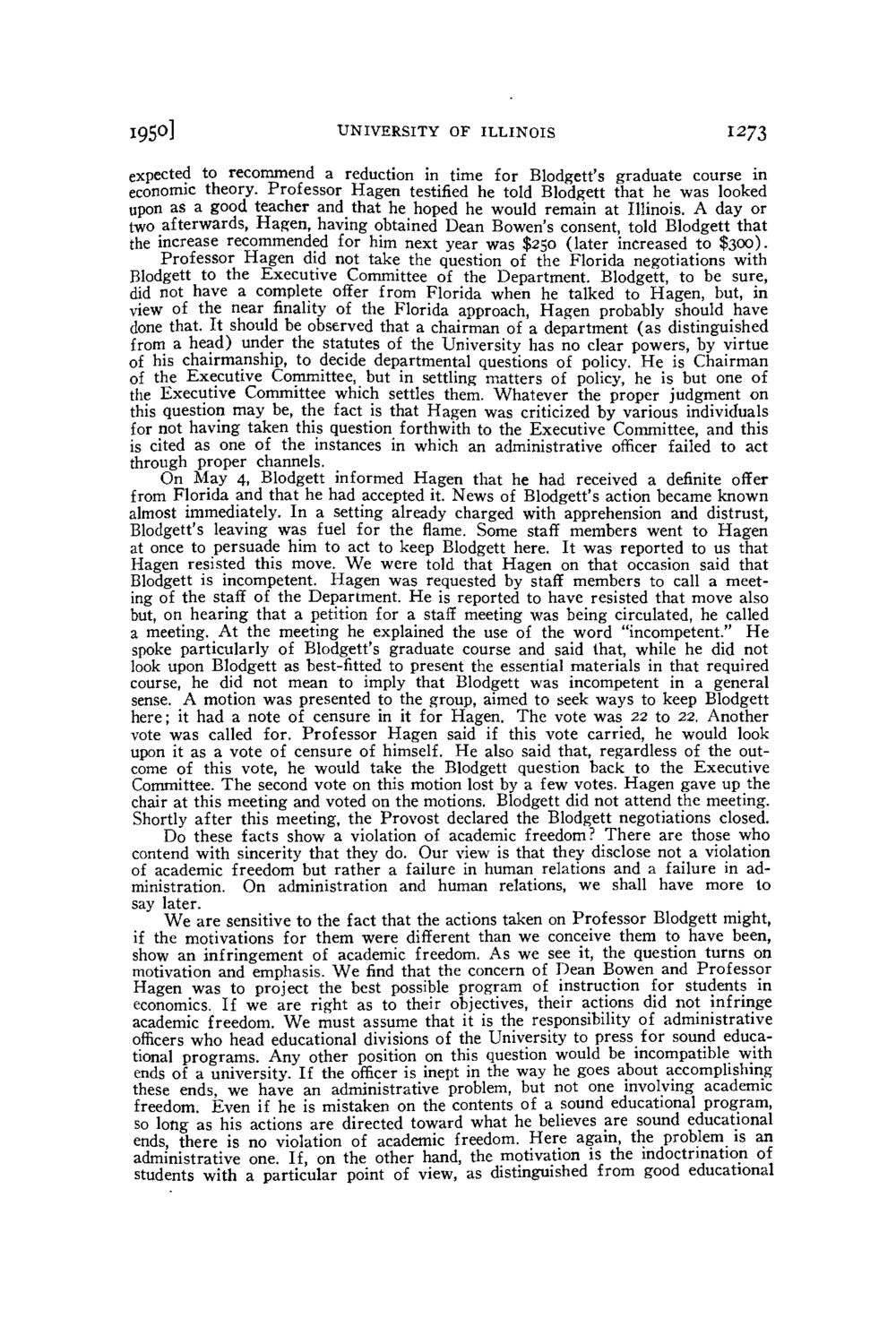| |
| |
Caption: Board of Trustees Minutes - 1950
This is a reduced-resolution page image for fast online browsing.

EXTRACTED TEXT FROM PAGE:
195°] UNIVERSITY OF ILLINOIS I273 expected to recommend a reduction in time for Blodgett's graduate course in economic theory. Professor Hagen testified he told Blodgett that he was looked upon as a good teacher and that he hoped he would remain at Illinois. A day or two afterwards, Hagen, having obtained Dean Bowen's consent, told Blodgett that the increase recommended for him next year was $250 (later increased to $300). Professor Hagen did not take the question of the Florida negotiations with Blodgett to the Executive Committee of the Department. Blodgett, to be sure, did not have a complete offer from Florida when he talked to Hagen, but, in view of the near finality of the Florida approach, Hagen probably should have done that. It should be observed that a chairman of a department (as distinguished from a head) under the statutes of the University has no clear powers, by virtue of his chairmanship, to decide departmental questions of policy. He is Chairman of the Executive Committee, but in settling matters of policy, he is but one of the Executive Committee which settles them. Whatever the proper judgment on this question may be, the fact is that Hagen was criticized by various individuals for not having taken this question forthwith to the Executive Committee, and this is cited as one of the instances in which an administrative officer failed to act through proper channels. On May 4, Blodgett informed Hagen that he had received a definite offer from Florida and that he had accepted it. News of Blodgett's action became known almost immediately. In a setting already charged with apprehension and distrust, Blodgett's leaving was fuel for the flame. Some staff members went to Hagen at once to persuade him to act to keep Blodgett here. It was reported to us that Hagen resisted this move. We were told that Hagen on that occasion said that Blodgett is incompetent. Hagen was requested by staff members to call a meeting of the staff of the Department. He is reported to have resisted that move also but, on hearing that a petition for a staff meeting was being circulated, he called a meeting. At the meeting he explained the use of the word "incompetent." H e spoke particularly of Blodgett's graduate course and said that, while he did not look upon Blodgett as best-fitted to present the essential materials in that required course, he did not mean to imply that Blodgett was incompetent in a general sense. A motion was presented to the group, aimed to seek ways to keep Blodgett here; it had a note of censure in it for Hagen. The vote was 22 to 22. Another vote was called for. Professor Hagen said if this vote carried, he would look upon it as a vote of censure of himself. He also said that, regardless of the outcome of this vote, he would take the Blodgett question back to the Executive Committee. The second vote on this motion lost by a few votes. Hagen gave up the chair at this meeting and voted on the motions. Blodgett did not attend the meeting. Shortly after this meeting, the Provost declared the Blodgett negotiations closed. Do these facts show a violation of academic freedom? There are those who contend with sincerity that they do. Our view is that they disclose not a violation of academic freedom but rather a failure in human relations and a failure in administration. On administration and human relations, we shall have more to say later. We are sensitive to the fact that the actions taken on Professor Blodgett might, if the motivations for them were different than we conceive them to have been, show an infringement of academic freedom. As we see it, the question turns on motivation and emphasis. W e find that the concern of Dean Bowen and Professor Hagen was to project the best possible program of instruction for students in economics. If we are right as to their objectives, their actions did not infringe academic freedom. We must assume that it is the responsibility of administrative officers who head educational divisions of the University to press for sound educational programs. Any other position on this question would be incompatible with ends of a university. If the officer is inept in the way he goes about accomplishing these ends, we have an administrative problem, but not one involving academic freedom. Even if he is mistaken on the contents of a sound educational program, so long as his actions are directed toward what he believes are sound educational ends, there is no violation of academic freedom. Here again, the problem is an administrative one. If, on the other hand, the motivation is the indoctrination of students with a particular point of view, as distinguished from good educational
| |